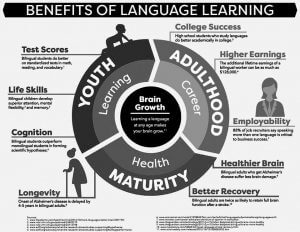 By Lisa Todd
By Lisa Todd
CA Upper School Spanish Teacher
Imagine you could take a class that would help you to achieve higher SAT and ACT scores; increase yourability to hypothesize in science; provide you with higher academic performance in college; delay the onset of cognitive deterioration; improve your memory, problem-solving, and critical-thinking skills; enhance your ability to concentrate and multitask; and also allow you to communicate with hundreds of millions of the 75% of the global population who don’t speak English (1).
The benefits for your brain from learning another language are significant, and they apply to people of all ages. In much the same way that weight lifting builds your muscles, research shows that learning another language helps build your brain. A 2012 Swedish study suggests learning another language results in literal brain growth.2
That’s just the tip of the iceberg, though. A 2013 Telegraph (UK) article summarizes: Speaking a foreign language improves the functionality of your brain by challenging it to recognise, negotiate meaning, and communicate in different language systems. This skill boosts your ability to negotiate meaning in other problem-solving tasks as well. Students who study foreign languages tend to score better on standardized tests than their monolingual peers, particularly in the categories of maths, reading, and vocabulary.3
But wait, there’s more! Learning another language also helps develop inter-cultural competence, an increased ability to empathize, and a glimpse of life outside your own bubble. Not only that, speaking a second (or third) language is always an advantage when looking for a job. Recent articles from Washington Times, NBC News, Huffington Post, IBM developerWorks, and New American Economy all warn that there is an exponentially growing need for bilingual employees, and that knowing another language is a highly sought-after skill in all sectors of the economy.
So what about all the extraordinary innovation in computer- assisted translation (Google Translate, etc.)? It certainly has its place, and can be a convenient tool in a pinch, especially while traveling. Languages, however, are highly nuanced and full of idiomatic phrases and unique vocabulary that cannot be directly translated, and are often a linguistic reflection of cultural values. For a highly entertaining and musical demonstration of the pitfalls of relying on Google Translate, watch some of the Google Translate Sings videos on YouTube, where Malinda Kathleen Reese enters popular song lyrics through multiple layers of Google Translate and then “translates” them back into English and sings the results.4
Hint: “Let it go” does not carry the same connotation as “Give up.” Speakers of another language are also more likely to have learned about important cultural norms, leading to fewer misunderstandings in international business situations. Language educators know that machine translations can’t fully capture the nuance of human language.
For our students at CA, most of our Middle and Upper school language courses are “immersion,” where the language of study is also the language of instruction. The pinnacle of Spanish study, for example, is AP Spanish Literature, in which students learn to apply literary analysis techniques to a collection of Spanish-language literature that spans six centuries.
Regardless of the course though, students are challenged to learn to think like linguists by communicating fearlessly, asking questions and making connections between languages and cultures.
Convinced you’d like to reap some of these benefits yourself? It’s never too late to start, there are an increasing number of (free!) quality apps and programs available for you to learn additional languages on your own, like Duolingo, Mango Languages, or Memrise. And of course, nothing beats conversation practice and immersion for practicing your new skills, so look for opportunities and fearlessly communicate whenever possible!
Endnotes
1 Spanish speakers: 570 million, French speakers: 220 million, Chinese speakers: 1.2 billion
2 Language learning makes the brain grow, Swedish study suggests https://www.sciencedaily.com/releases/2012/10/12100
8082953.htm
3 Why learn a foreign language? Benefits of bilingualism https://www.telegraph.co.uk/education/educationopinion/10126883/
Why-learn-a-foreign-language-Benefits-of-bilingualism.html
4 Google Translate Sings https://www.youtube.com/playlist?list=PLGnYtw5ezZI-BnVCUhMOcBqi9KggS1fhD
